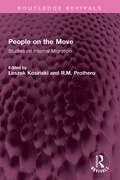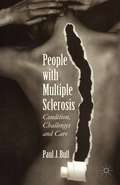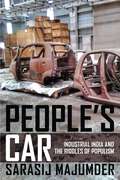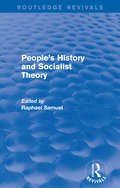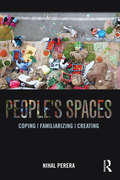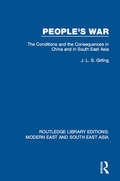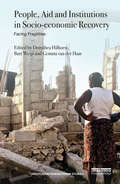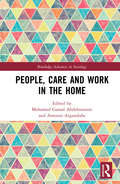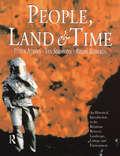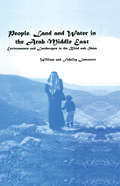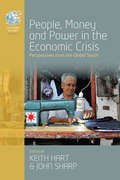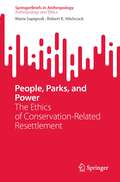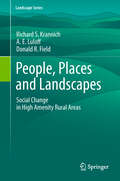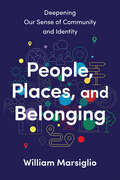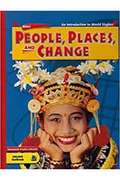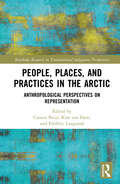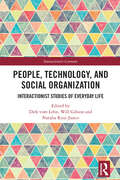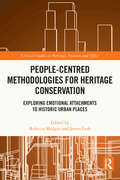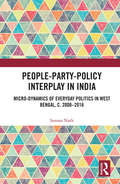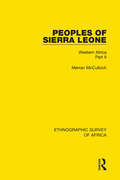- Table View
- List View
People on the Move: Studies on Internal Migration (Routledge Revivals)
by R. Mansell Prothero Leszek A. KosinskiOriginally published in 1975, this volume examines conceptual and theoretical aspects of the study of internal migration, both in chapters dealing specifically with theory and data and in case studies. The book discusses the question of who migrates, and why and what are the patterns of flow and direction of movement. The consequences of migration are analysed. Migration is one of the most difficult components of population change to conceptualize and measure and this book considers a wide range of aspects of migration and the problems connected with it.
People with Disabilities
by Lisa Schur Douglas Kruse Peter Blanck Lisa Schur Douglas KruseTo what extent are people with disabilities fully included in economic, political, and social life? People with disabilities have faced a long history of exclusion, stigma, and discrimination, but have made impressive gains in the past several decades. These gains include the passage of major civil rights legislation and the adoption of the 2006 UN Convention on the Rights of Persons with Disabilities. This book provides an overview of the progress and continuing disparities faced by people with disabilities around the world, reviewing hundreds of studies and presenting new evidence from analysis of surveys and interviews with disability leaders. It shows the connections among economic, political, and social inclusion, and how the experience of disability can vary by gender, race, and ethnicity. It uses a multidisciplinary approach, drawing on theoretical models and research in economics, political science, psychology, disability studies, law, and sociology.
People with Multiple Sclerosis: Condition, Challenges and Care
by Paul J. BullMultiple sclerosis is an incurable neurological disease of unknown cause with a fearful reputation for generating disability, unemployment, poverty and early death. This book critically surveys the current state of multiple sclerosis research, demonstrating the shortfall of current research undertaken on the lives of people with multiple sclerosis.
People's Car: Industrial India and the Riddles of Populism
by Sarasij MajumderIndia is witnessing a unique moment in populism, with sentiments divided between economic reforms that promise fast industrialization and protests that thwart such industrialization. This book offers an ethnographic study of divergent local responses to the proposed construction of a Tata Motors factory in eastern India that would have produced the Nano, the so-called people’s car. Initial excitement was followed by long protests among the villagers whose agricultural land was being acquired for the project. After these protests secured the relocation of the factory, further demonstrations followed, sometimes involving the same participants, seeking to bring the factory back.People’s Car explores this ambivalence concerning industrialization, asking why long drawn resistances against corporate industrialization coexist with political rhetoric and slogans promoting fast-paced industrialization. Majumder argues that such contradictory rhetoric and promises target divided sentiments in rural India where land is incommensurable with money and a site specially marked by desire for middle caste small landowners aspiring to futures beyond agriculture.Previous studies of industrialization have generally focused on either demands for development or populist critiques. Moving beyond romantic clichés about urban/rural divisions, People’s Car offers a single analytical and ethnographic framework demonstrating how pro- and anti-industrialization forces feed off each other.
People's History and Socialist Theory (Routledge Revivals)
by Raphael SamuelFirst published in 1981, this book brings together different types of work by numerous fragmented groups in the field of Marxist history and puts them in dialogue with each other. It takes stock of then recent work, explores the main new lines, and looks at the political and ideological circumstances shaping the direction of historical work, past and present. The scope of the book is international with contributions on African history, fascism and anti-fascism, French labour history, and the transition from feudalism to capitalism. It also incorporates feminist history and gives attention to some of the leading questions raised for social history by the women’s movement.
People's Spaces: Coping, Familiarizing, Creating
by Nihal PereraWho controls space? Powerful corporations, institutions, and individuals have great power to create physical and political space through income and influence. People’s Spaces attempts to understand the struggle between people and institutions in the spaces they make. Current literature on cities and planning often looks at popular resistance to institutional authority through open, mass-movement protest. These views overlook the fact that subaltern classes are not often afforded the luxury of open, organized political protest. People’s Spaces investigates individual’s diverse approaches in reconciling the difference between their spatial needs and spatial availability. Through case studies in Southeast Asia, India, Nepal, and Central Asia, the book explores how people accommodate their spatial needs for everyday activities and cultural practices within a larger abstract spatial context produced by the power-holders.
People's War: The Conditions and the Consequences in China and in South East Asia (Routledge Library Editions: Modern East and South East Asia #5)
by J.L.S. GirlingThis book, first published in 1969, casts a critical eye over the problem of insurgency. The author sees insurgency not just as a matter of technique – military tactics or organizational skill – nor as the result of ‘force and fraud’, but as ‘people’s war’: the conditions in which the mass of the people become involved, voluntarily or otherwise, on either side. He quotes Nasution’s statement, ‘The guerrilla movement is only the result, not the cause of the problem’. People’s war brings the peasantry, hitherto ignorant, apathetic or rejected, into the political process. For ‘war is … the continuation of politics by other means’. In Asia this was essentially a peasant’s war, arising when peasant grievances, interests or demands cannot be met under the existing ‘legitimate’ but urban or landowner-orientated system of rule. It shows little understanding to blame outside intervention when peasant – and nationalist – unrest leads to revolt. The Chinese Communists did not owe success to Soviet aid, the Vietminh to Chinese assistance or the Vietcong to North Vietnamese intervention. The conclusion applies to governments as to insurgents: no amount of outside aid can win the war for them if they themselves are incapable and the people – on whom they depend for support – have no will to fight. This book, based on first-hand experience of the area and on study of original sources, offers (1) an analysis of ‘people’s war’ in China, Indochina and Vietnam, (2) a critique of US policy in Laos and Vietnam and (3) a comparison with counter-measures in Malaya, the Philippines and Indonesia. It is both original and constructive.
People, Aid and Institutions in Socio-economic Recovery: Facing Fragilities (Routledge Humanitarian Studies)
by Bart Weijs Dorothea Hilhorst Gemma Van Der HaarAn estimated 2 billion people live in countries affected by fragility, conflict and violence. Extreme poverty is increasingly concentrated in these areas, and governments and international agencies seek avenues to enable socio-economic recovery and to support people as they try to rebuild their lives and livelihoods. People, Aid and Institutions in Socio-economic Recovery: Facing Fragilities provides an in-depth understanding of people’s strategies in the face of conflict and disaster-related fragility and examines how policies and aid interventions enable their socio-economic recovery – or fail to do so. Through field-based research, the book captures the complex and unfolding realities on the ground, exploring the interfaces between economic, social and institutional change. This provides a rich and unique vantage point from which to reflect on the impact of recovery policies. The book provides a set of cross-cutting findings that aim to inform policy and practice. The detailed case studies of the book lay bare key dynamics of recovery. Set against the findings from two chapters that review the literature, the cases provide evidence-based lessons for socio-economic recovery. The chapters combine qualitative and quantitative methodologies and form a valuable resource to researchers and postgraduate students of disaster management, conflict, humanitarian aid and social reconstruction, and development management.
People, Care and Work in the Home (Routledge Advances in Sociology)
by Mohamed Gamal Abdelmonem Antonio ArgandoñaIntroducing novel theoretical, empirical and practical investigations with case studies from UK, Europe, South America and South East Asia, the book offers a novel global outlook on how contemporary homes are facing genuine challenges from operational, economic, spatial, social and wellbeing perspectives. The changing demographics of our modern society have inevitably impacted the dynamics and relationships within the home from being personal and private to that of multiple work relationships; domestic work, care for older people, or supporting people with special needs. Whilst the home is a concept universally experienced, permeating every aspect of our lives, it remains an entity whose influence on health and wellbeing is poorly understood. This book brings together 17 different contributions from scholars, researchers and practitioners from different disciplinary and professional backgrounds including three feature articles by leading figures, such as Lord Best and Baroness Hollins. The chapters are organised within three parts that look at the triangle of people + work + care in the home. At a time when homes are increasingly becoming local hubs for care and wellbeing, this volume is a critical and useful addition to current literature in the social sciences, humanities, economics, culture, care and wellbeing in the domestic sphere.
People, Land and Time: An Historical Introduction to the Relations Between Landscape, Culture and Environment
by Ian Simmons Brian Roberts Peter AtkinsThis major new text provides an introduction to the interaction of culture and society with the landscape and environment. It offers a broad-based view of this theme by drawing upon the varied traditions of landscape interpretation, from the traditional cultural geography of scholars such as Carl Sauer to the 'new' cultural geography which has emerged in the 1990s. The book comprises three major, interwoven strands. First, fundamental factors such as environmental change and population pressure are addressed in order to sketch the contextual variables of landscapes production. Second, the evolution of the humanised landscape is discussed in terms of processes such as clearing wood, the impact of agriculture, the creation of urban-industrial complexes, and is also treated in historical periods such as the pre-industrial, the modern and the post-modern. From this we can see the cultural and economic signatures of human societies at different times and places. Finally, examples of landscape types are selected in order to illustrate the ways in which landscape both represents and participates in social change.The authors use a wide range of source material, ranging from place-names and pollen diagrams to literature and heritage monuments. Superbly illustrated throughout, it is essential reading for first-year undergraduates studying historical geography, human geography, cultural geography or landscape history.
People, Land and Water in the Arab Middle East: Environments and Landscapes in the Bilad ash-Sham (Studies in Environmental Anthropology #Vol. 2)
by Fidelity LancasterThe result of twenty-five years of research with different tribal groups in the Arabian peninsula, this study focuses on ethnographic descriptions of Arab tribal societies in five regions of the peninsula, with comparative material from others. Having become aware of the depth in time of Arab tribal structures, the authors have developed a view of Arabic tribal discourse where 'tribe' is seen as essentially an identity that confers access to a social structure and its processes.
People, Money and Power in the Economic Crisis: Perspectives from the Global South
by John Sharp Keith HartThe Cold War was fought between "state socialism" and "the free market." That fluctuating relationship between public power and private money continues today, unfolding in new and unforeseen ways during the economic crisis. Nine case studies -- from Southern Africa, South Asia, Brazil, and Atlantic Africa - examine economic life from the perspective of ordinary people in places that are normally marginal to global discourse, covering a range of class positions from the bottom to the top of society. The authors of these case studies examine people's concrete economic activities and aspirations. By looking at how people insert themselves into the actual, unequal economy, they seek to reflect human unity and diversity more fully than the narrow vision of conventional economics.
People, Parks, and Power: The Ethics of Conservation-Related Resettlement (SpringerBriefs in Anthropology)
by Robert K. Hitchcock Maria SapignoliThis book presents a critical review of the ethics of conservation-related resettlement. We examine what has become known as the” parks versus people” debate, also known as the “new conservation debate,” which has pitted indigenous and other local people against nation states and social scientists against ecologists and conservationists for the past several decades. Aiming to promote biodiversity conservation and habitat preservation, some biologists, park planners, and conservation organizations have recommended that indigenous and other people should be removed from protected areas. Local people, for their part, have argued that residents of the areas that were turned into protected areas, national parks, game reserves and monuments had managed them in productive ways for generations and that they should have the right to remain there and to use natural resources as long as they do so sustainably. This position is often supported by indigenous rights organizations and social scientists, especially anthropologists. There are also some conservation-oriented NGOs that have policies involving a more human rights-oriented approach aimed at poverty alleviation, sustainable development, and social justice. The book discusses biodiversity conservation, indigenous peoples (those who are ethnic minorities and who are often marginalized politically), and protected areas, those categories of land set aside by nation-states that have various kinds of rules about land use and residence. The focus initially is on case studies from protected areas in the United States including Yellowstone National Park, Yosemite National Park, and Glacier National Park and on national monuments and historical parks where resettlement took place. We then consider issues of coercive conservation in southern Africa, including Hwange National Park (Zimbabwe), the Central Kalahari Game Reserve (Botswana), Etosha National Park, and Bwabwata National Park (Namibia), and Kgalagadi Transfrontier Park (South Africa and Botswana). All of these cases involved involuntary resettlement at the hands of the governments. In the book we consider some of the social impacts of conservation-forced resettlement (CfR), many of which tend to be negative. After that, we assess some of the strategies employed by indigenous peoples in their efforts to recover rights of access to protected areas and the cultural and natural resources that they contain. Examples are drawn from cases in Asia, Africa, and South America. Conclusions are provided regarding the ethics of conservation-related resettlement and some of the best practices that could be followed, particularly with regard to indigenous peoples.
People, Place, Race, and Nation in Xinjiang, China: Territories of Identity
by David O’Brien Melissa Shani BrownIn one of the only works drawing on interviews with both Uyghurs and Han in Xinjiang, China, and postcolonial perspectives on ethnicity, nation, and race, this book explores how forms of banal racism underpin ideas of self and other, assimilation and modernisation, in this restive region. Significant international attention has condemned the CCP’s use of forced internment in ‘re-education’ camps, as well as its campaign of cultural assimilation. In this wider context, this book focuses upon the ways in which ethnic difference is writ through the banalities of everyday life: who one trusts, what one eats, where one shops, even what time one’s clocks are set to (Xinjiang being perhaps one of the only places where different ethnic groups live by different time-zones).Alongside chapters focusing upon the coercive ‘re-education’ campaign, and the devastating Ürümchi Riots in 2009, this book also unpacks how discourses of Chinese nationalism romanticise empire and promote racialised ways of thinking about Chineseness, how cultural assimilation (‘Sinicisation’) is being justified through the rhetoric of ‘modernisation’, how Islamic sites and Uyghur culture are being secularised and commodified for tourist consumption. We also explore Uyghur and Han perspectives, including of each other, giving insight into the diversity of opinions within both groups.Based on many years of living and working in China, and fieldwork and interviews specifically in Xinjiang, this book will be valuable to a variety of readers interested in the region and Uyghur and Han identity, ethnic/national identities in contemporary China, and racisms in non-western contexts.
People, Places and Change: An Introduction to World Studies (Western World)
by Holt Rinehart Winston StaffStudying geography requires the ability to understand and use various tools. This Skills Handbook explains how to use maps, charts, and other graphics to help you learn about geography and the various regions of the world. Throughout this textbook, you will have the opportunity to improve these skills and build upon them.
People, Places and Landscapes
by Richard S. Krannich A. E. Luloff Donald R. FieldThis volume is a cogent empirical analysis of the interplay between a region's natural amenities and its socioeconomic evolution. It focuses on the rural sectors of America's Intermountain West region, which lies between the Cascades and Sierra Nevada mountains to the west and the Rocky Mountains to the east. Coherently structured and meticulously detailed, it adds much to our understanding of the ways an area's forests, lakes, mountains, parkland and historic attractions affect residents' sense of well-being as well as the sociodemographic and economic changes they experience. The book examines patterns of growth and change linked to the emergence of 'New West' conditions, assessing their implications for the wider community as well as discussing the impact these trends could have on the consumption of natural resources. It also points to ways in which communities and their development can be managed sustainably. The tight geographical focus of this valuable resource ensures a depth of analysis which can be applied to similar regions worldwide. Based on a large-scale, random-sample survey of both full-time and seasonal residents, it provides a much-needed overview of the macro-level economic, demographic, and social transformations affecting rural communities in America. As such, the book has relevance for all researchers concerned with rural development, the changes impacting rural landscapes, and natural resource management.
People, Places, and Belonging: Deepening Our Sense of Community and Identity
by William MarsiglioPlace matters – for good and bad. Infinitely diverse in form, place embodies the action settings where social life happens. Often fighting to preserve a sense of group belonging in the process, we design places to reflect our values and interests. With an eye on our rapidly changing world, People, Places, and Belonging explores how social realities at every level are affected by the places we collectively forge across various social domains. The book shows how place-related circumstances can promote personal empowerment, civic engagement, and social and environmental justice. Discussing places that affect personal and social well-being, including homes, communities, vehicles, and the metaverse, William Marsiglio illustrates how a web of social processes involving claims, attachments, rituals, and transitions (CART) structure our experiences in place. The author argues that we can use decision-making principles to enhance our attachments, encourage supportive rituals, smooth out transitions, and manage claims with less conflict and more social justice. Armed with a heightened place consciousness and ethical principles, People, Places, and Belonging ultimately posits that we must individually and collectively build places that enrich our lives, celebrate the communal spirit, and foster social equity and ecological justice.
People, Places, and Change: An Introduction to World Studies
by Robert J. Sager David M. Helgren Alison S. BrooksPeople, Places, and Environment Reader
by William J. CohenBook for People Places and Environment Gen Ed. at Temple University.
People, Places, and Practices in the Arctic: Anthropological Perspectives on Representation (Routledge Research in Transnational Indigenous Perspectives)
by Frédéric Laugrand Cunera Buijs Kim Van DamThis collection follows anthropological perspectives on peoples (Canadian Inuit, Norwegian Sámi, Yupiit from Alaska, and Inuit from Greenland), places, and practices in the Circumpolar North from colonial times to our post-modern era. This volume brings together fresh perspectives on theoretical concepts, colonial/imperial descriptions, collaborative work of non-Indigenous and Indigenous researchers, as well as articles written by representatives of Indigenous cultures from an inside perspective. The scope of the book ranges from contributions based on unpublished primary sources, missionary journals, and fairly unknown early Indigenous sources and publications, to those based on more recent Indigenous testimonies and anthropological fieldwork, museum exhibitions, and (self)representations in the fields of fashion, marketing, and the arts. The aim of this volume is to explore the making of representations for and/or by Circumpolar North peoples. The authors follow what representations have been created in the past and in some cases continue to be created in the present, and the Indigenous employment of representations that has continuity with the past and also goes beyond "traditional" utilization. By studying these representations, we gain a better understanding of the dynamics of a society and its interaction with other cultures, notably in the context of the dominant culture’s efforts to assimilate Indigenous people and erase their story. People’s ideas about themselves and of "the Other" are never static, not even if they share the same cultural background. This is even more the case in the contact zone of the intercultural arena. Images of "the Other" vary according to time and place, and perceptions of "others" are continuously readjusted from both sides in intercultural encounters. This volume has been prepared by the Research Group Circumpolar Cultures (RGCC) which is based in the Netherlands. Its members conduct research on social and cultural change focusing on topics that are of interest to the Indigenous peoples of the Arctic. The RGCC builds on a long tradition in Arctic studies in the Netherlands (Nico Tinbergen, Geert van den Steenhoven, Gerti Nooter, and Jarich Oosten) and can rely on rich Arctic collections of artefacts and photographs in anthropological museums and extensive library collections. The expertise of the RGCC in Arctic studies is internationally acknowledged by academics as well as circumpolar peoples.
People, Practice, Power: Digital Humanities outside the Center (Debates in the Digital Humanities)
by Siobhan Senier Anne B. McGrail Angel David NievesAn illuminating volume of critical essays charting the diverse territory of digital humanities scholarship The digital humanities have traditionally been considered to be the domain of only a small number of prominent and well-funded institutions. However, through a diverse range of critical essays, this volume serves to challenge and enlarge existing notions of how digital humanities research is being undertaken while also serving as a kind of alternative guide for how it can thrive within a wide variety of institutional spaces. Focusing on the complex infrastructure that undergirds the field of digital humanities, People, Practice, Power examines the various economic, social, and political factors that shape such academic endeavors. The multitude of perspectives comprising this collection offers both a much-needed critique of the existing structures for digital scholarship and the means to generate broader representation within the field. This collection provides a vital contribution to the realm of digital scholarly research and pedagogy in acknowledging the role that small liberal arts colleges, community colleges, historically black colleges and universities, and other underresourced institutions play in its advancement. Gathering together a range of voices both established and emergent, People, Practice, Power offers practitioners a self-reflexive examination of the current conditions under which the digital humanities are evolving, while helping to open up new sustainable pathways for its future. Contributors: Matthew Applegate, Molloy College; Taylor Arnold, U of Richmond; Eduard Arriaga, U of Indianapolis; Lydia Bello, Seattle U; Kathi Inman Berens, Portland State U; Christina Boyles, Michigan State U; Laura R. Braunstein, Dartmouth College; Abby R. Broughton; Maria Sachiko Cecire, Bard College; Brennan Collins, Georgia State U; Kelsey Corlett-Rivera, U of Maryland; Brittany de Gail, U of Maryland; Madelynn Dickerson, UC Irvine Libraries; Nathan H. Dize, Vanderbilt U; Quinn Dombrowski, Stanford U; Ashley Sanders Garcia, UCLA; Laura Gerlitz; Erin Rose Glass; Kaitlyn Grant; Margaret Hogarth, Claremont Colleges; Maryse Ndilu Kiese, U of Alberta; Pamella R. Lach, San Diego State U; James Malazita, Rensselaer Polytechnic Institute; Susan Merriam, Bard College; Chelsea Miya, U of Alberta; Jamila Moore Pewu, California State U, Fullerton; Urszula Pawlicka-Deger, Aalto U, Finland; Jessica Pressman, San Diego State U; Jana Remy, Chapman U; Roopika Risam, Salem State U; Elizabeth Rodrigues, Grinnell College; Dylan Ruediger, American Historical Association; Rachel Schnepper, Wesleyan U; Anelise Hanson Shrout, Bates College; Margaret Simon, North Carolina State U; Mengchi Sun, U of Alberta; Lauren Tilton, U of Richmond; Michelle R. Warren, Dartmouth College.
People, Technology, and Social Organization: Interactionist Studies of Everyday Life (Interactionist Currents)
by Will Gibson Dirk Vom Lehn Natalia Ruiz-JuncoThis insightful and accessible book is a response to the increasing important role that technology plays in everyday life, and the urgent need for empirical studies that analyse the impact of technology on social practices. The chapters in this co-edited collection reveal how technology is oriented to and embedded within the social organization of action in a wide range of settings and institutions, including education, markets, arts and culture, health and social care, media, politics, and science. In their analyses, the contributing authors adopt interactionist perspectives to explore how the meanings of technology emerge and are negotiated within and through action and interaction. The volume comprises 14 empirical chapters from authors working in fields such as symbolic interactionism, ethnomethodology, conversation analysis, discourse methods, ethnographic enquiry, video-based methods, and others. The chapters are framed by an introduction and a concluding discussion by the co-editors which draws out the key themes and issues that the individual chapters speak to, and show the importance of these themes for the social sciences and for society. The book is primarily aimed at researchers in the social sciences, including sociology, social psychology, organization studies, and beyond whose work is concerned with the interplay between social interaction, technology, and institutions.
People-Centred Methodologies for Heritage Conservation: Exploring Emotional Attachments to Historic Urban Places (Critical Studies in Heritage, Emotion and Affect)
by Rebecca Madgin James LeshThis book presents methodological approaches that can help explore the ways in which people develop emotional attachments to historic urban places. With a focus on the powerful relations that form between people and places, this book uses people-centred methodologies to examine the ways in which emotional attachments can be accessed, researched, interpreted and documented as part of heritage scholarship and management. It demonstrates how a range of different research methods drawn primarily from disciplines across the arts, humanities and social sciences can be used to better understand the cultural values of heritage places. In so doing, the chapters bring together a series of diverse case studies from both established and early-career scholars in Australia, China, Europe, North America and Central America. These case studies outline methods that have been successfully employed to consider attachments between people and historic places in different contexts. This book advocates a need to shift to a more nuanced understanding of people’s relations to historic places by situating emotional attachments at the core of urban heritage thinking and practice. It offers a practical guide for both academics and industry professionals towards people-centred methodologies for urban heritage conservation.
People-Party-Policy Interplay in India: Micro-dynamics of Everyday Politics in West Bengal, c. 2008 – 2016
by Suman NathThis book analyses the political transition in West Bengal, India, which witnessed longest democratically elected Left regime of the world. It examines and compares micro-dynamics of political practices in India and delineates underlying political themes of state politics. The author explores the politics of land reform and the anti-land-acquisition movements which were critical points in the contemporary history of Bengal in independent India. The volume further delves into the caste and communal politics which had been latent until the Left Front’s loss in the state, as well as the what sets apart politics in West Bengal from other Indian states. Based on thorough ethnographic research, this volume will be of great interest to scholars and researchers of South Asian studies, politics and political processes, sociology and social anthropology.
Peoples of Sierra Leone: Western Africa Part II
by Merran McCullochRoutledge is proud to be re-issuing this landmark series in association with the International African Institute. The series, published between 1950 and 1977, brings together a wealth of previously un-co-ordinated material on the ethnic groupings and social conditions of African peoples. Concise, critical and (for its time) accurate, the Ethnographic Survey contains sections as follows: Physical Environment Linguistic Data Demography History & Traditions of Origin Nomenclature Grouping Cultural Features: Religion, Witchcraft, Birth, Initiation, Burial Social & Political Organization: Kinship, Marriage, Inheritance, Slavery, Land Tenure, Warfare & Justice Economy & Trade Domestic Architecture Each of the 50 volumes will be available to buy individually, and these are organized into regional sub-groups: East Central Africa, North-Eastern Africa, Southern Africa, West Central Africa, Western Africa, and Central Africa Belgian Congo. The volumes are supplemented with maps, available to view on routledge.com or available as a pdf from the publishers.
